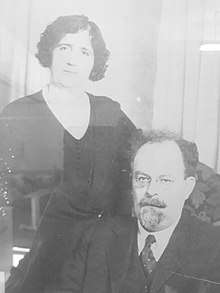Abraham Zevi Idelsohn
Abraham Zevi Idelsohn (Hebrew: אַבְרָהָם צְבִי אידלסון Avrohom Tzvi Idelsohn in Ashkenazi Hebrew; middle name also rendered Tzvi, Zvi, Zwi, or Zebi; July 14, 1882 – August 14, 1938) was a prominent Jewish ethnologist, musicologist and composer, who conducted several comprehensive studies of Jewish music around the world.

Idelsohn was born in Feliksberg, Latvia and trained as a cantor. He worked briefly in both Europe and South Africa before emigrating to Palestine in 1905 and establishing a school of Jewish music there in 1919. In 1922 he moved to Cincinnati, Ohio to take a position as professor of Jewish music at Hebrew Union College. He died in Johannesburg, South Africa, where he also supported the establishment of South African Progressive Judaism.[1][2]
Idelsohn is generally acknowledged as the “father” of modern Jewish musicology. During his time in Jerusalem, he noted a great diversity of musical traditions among the Jews living in the region. Idelsohn examined these traditional melodies and found recurring motifs and progressions that were not found in any other national music. This suggested a common origin for musical phrases that went back to Israel/Palestine in the first century C.E. He found that these motifs fell into three distinct tonal centers, which corresponded to the Dorian, Phrygian, and Lydian modes of the ancient Greeks. Each of these modes elicited a distinct psycho-emotional response. The Dorian Mode was used for texts of an elevated and inspired nature; the Phrygian for sentimental texts, with their very human outbreaks of feeling, both of joy and grief; and the Lydian was used in composing music for the texts of lamenting and confessions of sins. Idelsohn further categorized and defined these motives as ones that either prepared a musical phrase, began it, or concluded it.[3]
His works include the monumental Thesaurus of Hebrew Oriental Melodies (10 volumes, 1914–1932) and Jewish Music (1929). He is considered to be the author of the lyrics of the famous Jewish folk song "Hava Nagila."[4][5]
He is the maternal grandfather of Joel Goodman Joffe (Baron Joffe).[5][6]
Notes
- A history of Reform Judaism in SA SAUPJ. Accessed on 6 December 2019
- Norman Lebrecht, The complete companion to 20th century music, Simon & Schuster, 2000. p. 175.
- "Ancient Echoes: Rediscovering Music & Chant of Middle Eastern Spirituality". San Antonio Vocal Arts Ensemble. savae.org. Archived from the original on March 24, 2015.
- See Who Wrote Havah Nagilah? at RadioHazak.com
- Joel Joffe mentioned his grandfather and his grandfather's role in writing Hava Nagila in an appearance on BBC Radio 4 Desert Island Discs on 28 October 2007
- More evidence of the relationship between Idelsohn and Joffe is provided in this family tree